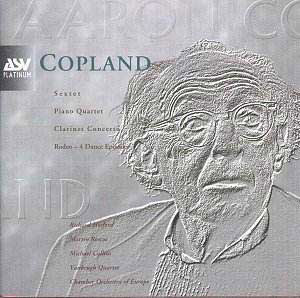On first acquaintance, these new ASV releases seem to have
a slightly more interesting agenda than some budget re-issues. The brief
appears to be to give us a broader picture of a composer’s output, rather
than simply pandering to popular taste with all the usual ‘war-horses’.
Take the present Copland issue. Yes, there are the ubiquitous Rodeo
- Dance Episodes, available in numerous alternative versions, though
nearly always coupled with, say, Billy the Kid or Appalachian
Spring. Here, we get a good cross-section of other Copland, much of
which is top-drawer stuff, and in superb performances.
To deal with Rodeo first, although you are likely
to have a version already in your collection, don’t let that put you
off investigating this release. Even if the other items weren’t of real
interest, this is a still a cracking performance of this much-recorded
work. The Bournemouth Symphony play for their lives, and John Farrer,
whose other work I have to confess to not knowing, proves himself a
worthwhile advocate of the Copland style. Rhythms fizz and bounce, accents
are sharply etched, solo woodwind work is exceptional, and the recording
has tremendous weight and amplitude, altogether in the demonstration
category. This is a rendition worthy of Bernstein himself.
The wonderful Clarinet Concerto, surely one of Copland’s
finest pieces, gets a similarly idiomatic performance. The contemplative,
slightly bluesy opening, is played with a rapt simplicity that is just
right. Copland packs a lot into seventeen minutes, and the mood swings
and marvellous variety of material are superbly judged by all. Richard
Horsford’s tone is warm yet full, and the support from the Chamber Orchestra
of Europe, here clearly enjoying themselves enormously, is as musical
as one could wish for. I love the virile, athletic string tone at 12.59,
where Copland is toying with a Brazilian hit tune in a truly jazz-like
fashion. The last few bars, with their overt reference to the famous
clarinet opening of Rhapsody in Blue, crown an invigorating and
satisfying reading, well up with the best.
Of real interest to collectors may well be the two
chamber items, though there could be a hint of familiarity with one
of them. The Sextet in fact started out life as the Short Symphony,
with Copland fashioning the chamber work in response to criticism from,
among others, Stokowski and Koussevitsky. The rhythmic complexity they
obviously encountered in its orchestral form are still very much in
evidence in the sextet, but textures are understandably leaner and clearer.
A direct comparison between the two makes for very interesting listening,
and both versions are equally enjoyable. The spikiness of the opening
movement is brilliantly conveyed by Roscoe and the Vanbrugh Quartet,
who make light of the fidgety cross-rhythms that form the backbone of
the movement. Copland in super-Stravinsky mode is always exciting, and
it is nicely balanced by the elegiac slow section, with its hints of
later works to come. The finale, marked precise and rhythmic,
gets playing that is exactly that. There are clear echoes of the angular
melodic quality of the earlier Piano Variations, as well as foreshadows
of the later El Salon Mexico, and the tremendous forward impetus
is well sustained by these players.
The same could be said of the Piano Quartet of 1950,
a fine piece not often heard today. It was composed, according to the
composer ‘… in a barn in Richmond, Massachusetts with a beautiful view
of open meadows and distant mountains’. Copland had always toyed with
serialism, and this piece does have hints of a tone-row, albeit eleven
rather than twelve (this may point to Copland’s ambivalent attitude
to the method). The tonal pull is always strong, and though the melodies
have an angularity and dissonant ‘spice’ about them, they are completely
memorable and distinct. The way the superb first movement unfolds in
great open paragraphs is a good example. The restless scherzo, which
Bernstein so admired, is beautifully pointed in this rendition – listen
to the marvellously uniform syncopations at 2.39 onwards. This is major
Copland, and ought to be better known. Maybe this excellent disc will
do the trick.
Recording quality is uniformly high throughout, and
notes are very brief but certainly helpful. This is a cheap way to get
to know other aspects of this composer’s art, and it is recommended
unreservedly.
Tony Haywood


